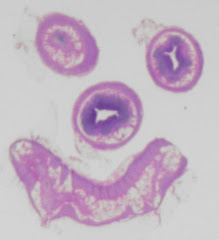For those of you who are reading this who may not be familiar with Pathologists' Assistants and what they do, I thought that a little background, history really, might be appreciated.
In the late '60s, as a result of decreased medical school class sizes, the number of medical residents in all specialties, Pathology included, decreased dramatically. This was a continental phenomenon. At the same time, partially due to deficit financing, tertiary care hospitals were growing in leaps and bounds. The number of surgeries was climbing and the number of in-patient beds grew considerably. With the increase in surgeries, the number of specimens to be examined in Surgical Pathology also increased. The examination of these was, in teaching hospitals, traditionally a task assigned to pathology residents.
Very soon after the creation and recognition of the profession of Physician Assistant (Duke University, 1965), the profession of Pathologists' Assistant was also created (also at Duke U.). Post-baccalauriate curricula (2-yr) for the training of PAs was at 5 American universities at that time and successful graduates wrote a fellowship exam and became Registered PAs. However, national certification did not exist and the American Association of Pathologists' Assistants (AAPA) has been working diligently for the last several years to gain national certification for PAs in the USA. There are a large number of on-the-job trained (OJT) PAs, possibly more numerous than graduates of the accredited university programs.
The tasks which PAs perform are those which have always been the responsibility of physicians. In Canada the provincial ministries of health continue to mandate pathologists or pathology residents to perform the tasks which at most larger hospitals are performed by PAs. It is important that PAs gain recognition and, with that recognition, regulation for the sake of public safety (indeed for the protection of the PAs themselves, the Pathologists, the departments of Laboratory Medicine and the hospitals). Educational standards and minimum pre-requisites must be set. Provincial regulatory colleges, although recognising the existance of PAs, have not yet been mandated to regulate the profession. PAs, who are largely drawn from Medical Laboratory Technologist stock, realize that they are functioning far beyond the scope that their credentials would ordinarily allow.
To place the profession of Pathologists' Assistant in the rather bewildering heirarchy of para-medical personnel, one might do well to think of professions like Nurse Practitioners, Physician Assistant, Midwife and others who are performing the tasks which have heretofore been solely the responsibility of medical doctors.
I have been fortunate to enter the profession while it was still in its infancy. I have watched -- and have been instrumental in developing -- its maturation. It has been an evolution of sorts wherein over the years, more and more responsibilities were gradually taken on by myself and the slowly-growing number of other PAs at The Ottawa Hospital. As the PAs earned the trust of the Pathologists, the level of responsibility grew and grew. Now thirty years into their evolution, PAs are undeniably an integral, necessary part of the division of Pathology. But there's more; it has been recognised that PAs actually provide a superior level of quality of 'product' than the medical doctors themselves. Oncologists and surgeons realize that their patients are better served if the specimens are examined by PAs.
In many provinces, the degree to which Laboratory Technologists work is monitored by workload units. There is a precise listing of all functions, each given a unit value which is primarily based on time. Despite the 30-existence of PAs, their workload is still not recognised. It is the duty of the Canadian Institute for Health Information (CIHI) to maintain, administer and upgrade the unit structure (called the MIS Guidelines). In 2003, I submitted a lengthy application to the CIHI to have the tasks which are performed by PAs credited. It has been 1 1/2 years and PAs are still waiting. Their recognition which their profession deserves will be advanced significantly if/when the CIHI eventually approves the application. I am truly hopeful that this will happen some time before I retire.
Sunday, January 30, 2005
Subscribe to:
Post Comments (Atom)



Hey Bill Stinson,
ReplyDeleteYour blog "this post", leads me to believe you will find my information on NBDHE to be very beneficial.
We have many hundreds of study prep guides and aids to help you pass your exams without weeks and months of endless studying. Come over now and have a look for yourself ... you have nothing to loose but everything to gain!
Best Wishes
Emily